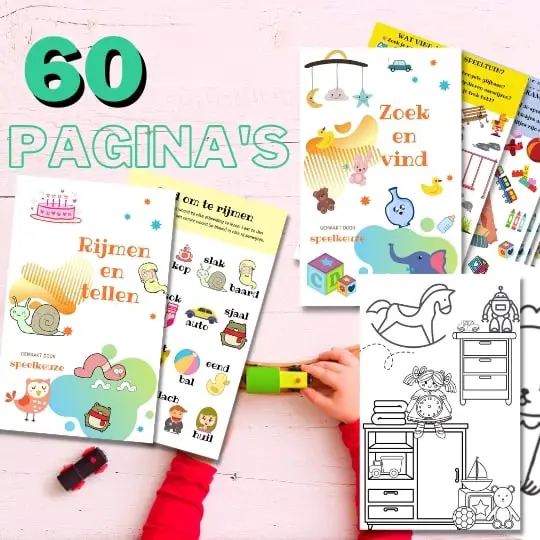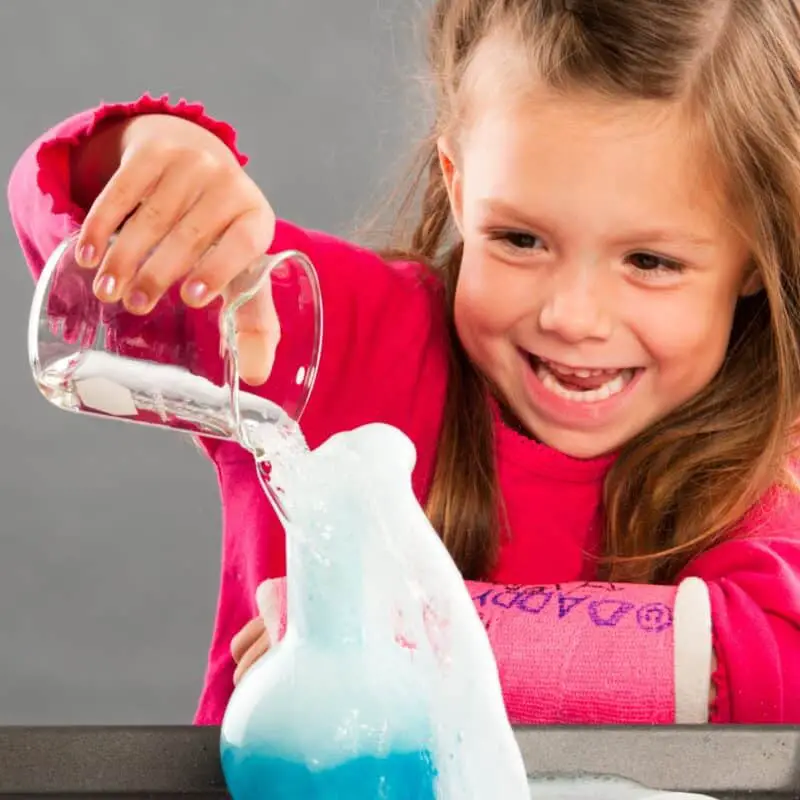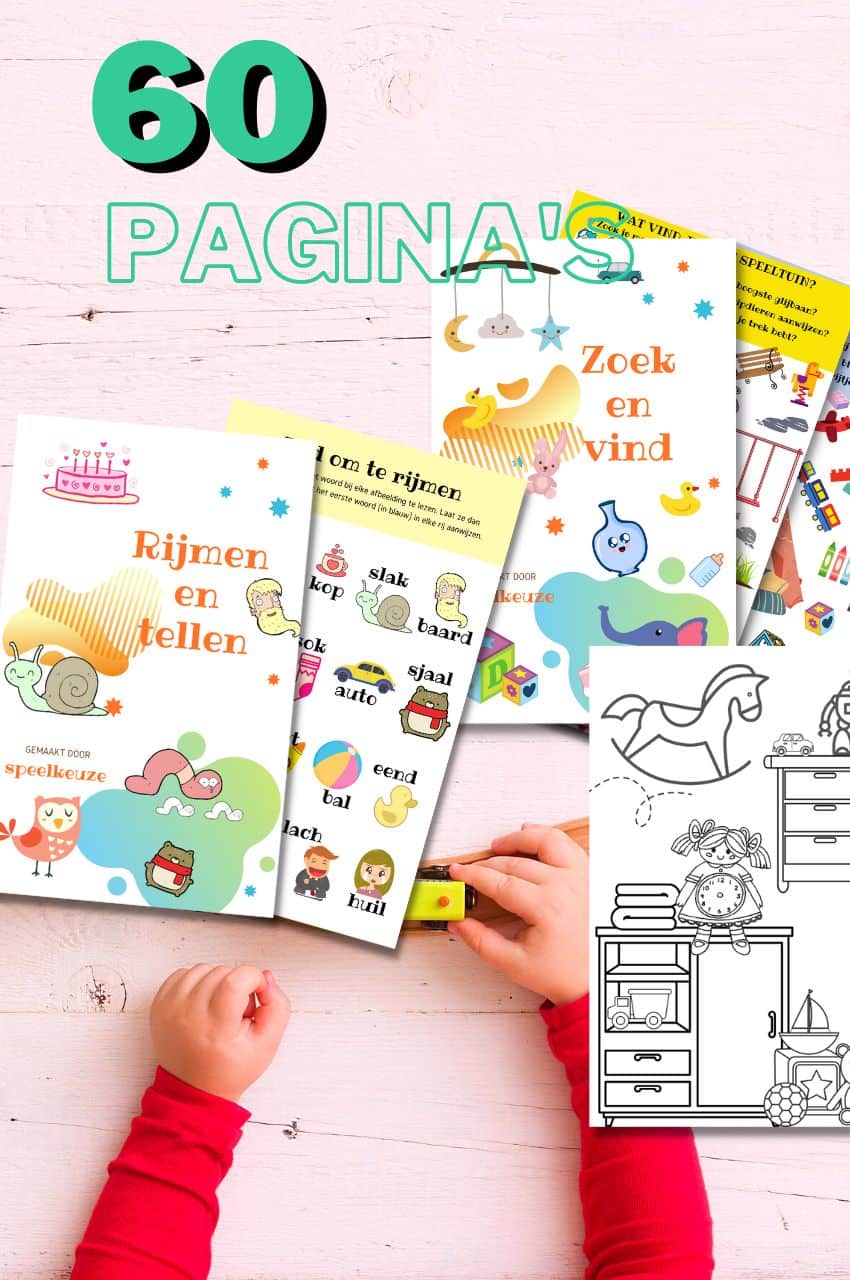Learning science: 5 activities for kids

Always something to do for the holidays or rainy day?
Play Choice now has the ultimate activity book collection, with over 60 pages of fun coloring pages and educational puzzles.
Science is fun for children because it stimulates their curiosity and they want to discover new things all the time. Science is an adventure of discovering new things, looking at stars, experimenting with chemistry, exploring the human body, the universe, and the world around them.
In this article I will tell you why science is so much fun for children and how you can introduce it in a fun way.


From toddler to toddler activity book collection
Educational games and coloring pages for 3 to 6 years
Your toddler and preschooler will love this e-book, along with the accompanying printables. He or she can play with it at every stage of development, together with mom and dad.
Buy at Bol.comWhat we discuss in this comprehensive post:
The magic of science for kids
Science for kids is all about discovering new things in a playful and fun way. Kids enjoy learning about how things work, from the human body to the universe. They want to know how many stars there are, how the body stays healthy and how doctors make us better. By approaching science in a playful way, children develop an attitude of discovery and learn naturally.
Scientific activities for young researchers
There are plenty of activities and programs that introduce children to science in a fun and interactive way. For example, there are the Children's University and Junior Colleges, where children from the upper years of primary school can get a taste of university life. Since its foundation in October 2008 by Marie Roelofs and Saskia van Tilburg, hundreds of children have attended these colleges and enjoyed the scientific adventures.
The impact of science on a changing society
Through science, children not only learn about the world around them, but also about the impact that scientific research has on our society. They discover how science helps solve problems and improve our lives. By introducing children to science at an early age, we prepare them for a future where they can play an active role in shaping a better world.
Science as adventure
For children, science is an adventure in which they keep discovering and learning new things. Whether looking at the stars, experimenting with chemistry or exploring how the human body works, science offers endless opportunities to play, learn and grow. And who knows, maybe these young researchers will be the future Nobel laureates or pioneering scientists of tomorrow!
The magic of science for kids
Children are naturally curious and often ask the question “why?”. Science helps them find answers to these questions and understand the world around them. They like to explore things and learn how things work. This process of discovery and learning is what makes science so attractive to young minds.
Interesting experiments
Science is not just reading books and listening to the teacher. It's also about experimenting and exploring the world around us. Kids enjoy performing experiments, such as making a volcanic eruption with baking soda and vinegar or examining microbes with a microscope. These hands-on experiences make science fun and engaging.
Collaborate and learn from each other
Science is often a group activity where children work together in teams to solve problems and discover new things. They learn from each other and build social skills as they work together towards a common goal. This makes science not only fun, but also a valuable learning experience.
Imagination and creativity
Science encourages children to imagination en creativity to use. They can come up with new ideas, design solutions to problems and set up their own experiments. This helps them develop their thinking skills and think out of the box, adding to the fun of science.
The satisfaction of finding answers
When children solve a scientific problem or discover a new fact, they experience a sense of accomplishment and pride. This sense of accomplishment motivates them to continue learning and discovering more, making science a lasting enjoyable activity.
In short, science is fun for children because it stimulates their curiosity, allows them to explore and learn through interesting experiments, and encourages them to work together, their imagination to use and learn through play.
The ideal starting age for science in children
It's never too early to introduce kids to the world of science. From a young age, children are naturally curious and eager to learn. They discover the world around them and ask a lot of questions. This way they can start discovering science at a young age, for example from 3 to 4 years old, through games and toys (best science kits reviewed here). At home, parents can help their children by experimenting together with materials that are already available, such as water, sand and clay.
Science in primary school
At primary school, children are increasingly exposed to science. In the Netherlands, attention is paid to science and technology from group 1, although this is sometimes done in small chunks. Through games, experiments and experiments, children learn about scientific concepts and skills in a fun and interactive way.
Some examples of science in elementary school are:
- Studying plants and animals in nature
- Learning about the weather and climate
- Discovering how magnets and electricity work
- Carrying out simple chemistry experiments
Science and sports
Science and movement go hand in hand. Children learn better when they are actively involved in a task. Sports and exercise can help to improve attention and concentration, which ultimately contributes to better learning performance. That is why it is important to provide children with sufficient exercise while learning. This can be done, for example, through educational games in which movement plays a role, such as conducting a physics experiment in which the children have to run, jump or throw themselves.
The role of parents and educators
Parents and educators play a major role in stimulating children's interest in science. By experimenting, asking questions and discovering together with your child, you make science fun and accessible. In addition, as a parent you can support your child by:
- Make interesting books and magazines about science available
- Go to science museums or exhibitions together
- Watch scientific TV programs or movies
- Talk about scientific topics and current events
Basically, kids can start exploring science at an early age. By learning through play and getting enough exercise, science becomes a fun and fascinating experience for children. Parents and educators play an important role in this by stimulating and supporting their children in their scientific journey of discovery.
Children's journey of discovery in science
Research shows that there is a relationship between physical activity and cognition in children. Active children often perform better at school and have better attention and concentration. Some results of these studies are:
- Physical activity has a positive effect on cognitive functions, such as attention, memory and problem solving.
- Differences have been found between boys and girls, but in general active children perform better at school.
- Physical activity can also help improve spelling and reading skills.
Scientific research in primary education
In Dutch primary education, more and more attention is being paid to science and technology. This has led to a growing number of research projects in which children actively participate. Some examples of this are:
- The research project “Activity, Cognition and Education” of the University of Groningen (UMCG), in which the effects of physical activity on cognition and school performance are investigated.
- Anneke van Dijk's thesis, in which she investigated the relationship between physical activity and cognitive performance in adolescents.
Online and free science activities
In addition to the activities at school, there are also numerous online and free science activities for children available. In this way they can become acquainted with science and research in an accessible way. Some examples of this are:
- Experiments and tests that children can perform at home, such as making a volcano or growing crystals.
- Online courses and workshops in science and engineering, such as programming, robotics, or physics.
In short, science is a great way for kids to stimulate their curiosity and eagerness to learn. By doing research, they not only learn about the world around them, but they also develop important skills that will help them in their future lives.
Conclusion
The fact is that science is fun for children. It stimulates their curiosity and urge to explore and helps them imagination en creativity to discover. It's a fun way to help children grow into inquisitive scientists.
If you teach kids the right ways to explore science, they'll develop themselves into new Nobel laureates surprisingly quickly!

Always something to do for the holidays or rainy day?
Play Choice now has the ultimate activity book collection, with over 60 pages of fun coloring pages and educational puzzles.
Joost Nusselder, the founder of Speelkeuze.nl is a content marketer, father and loves trying out new toys. As a child he came into contact with everything related to games when his mother started the Tinnen Soldaat in Ede. Now he and his team create helpful blog articles to help loyal readers with fun play ideas.
